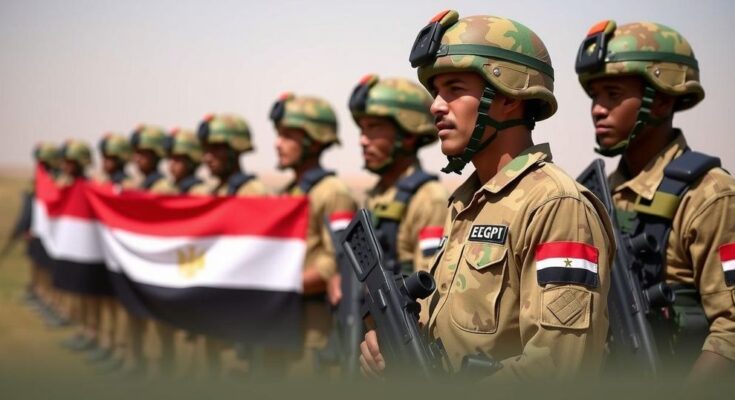Egypt’s Foreign Minister announced the country’s participation in a new AU peacekeeping force in Somalia, following a request from the Somali government. This move aims to strengthen bilateral relations amid tensions with Ethiopia. Egypt will work within the Africa Union Support and Stabilization Mission in Somalia to address insecurity from the Islamist insurgency, reaffirming its commitment to Somalia’s sovereignty.
On Monday, Egypt’s Foreign Minister, Badr Abdelatty, announced that Egypt would participate in a new African Union peacekeeping force to be deployed in Somalia. This decision follows a request from the Somali government and the approval of the African Union Peace and Security Council, as highlighted during a joint press conference with Somali Foreign Minister Ahmed Moalim Fiqi in Cairo. This strategic move is indicative of strengthening ties between Egypt and Somalia amidst rising tensions with Ethiopia following a maritime agreement between Ethiopia and the region of Somaliland which has been contentious for Mogadishu.
The forthcoming African Union Support and Stabilization Mission in Somalia (AUSSOM) will replace the African Union Transition Mission in Somalia (ATMIS), which is set to conclude on December 31. Abdelatty reiterated Egypt’s commitment to Somalia’s territorial integrity, emphasizing that Egypt opposes any unilateral actions that could undermine Somalia’s unity. Recent diplomatic efforts, facilitated by Turkey, have aimed to mend relations between Somalia and Ethiopia following a prolonged dispute regarding regional dynamics.
Somalia’s current government has welcomed Egypt’s involvement, particularly after previously stating that Ethiopian troops would not be included in the AU peacekeeping mission. The details surrounding Egypt’s military engagement remain unclear, yet both nations are focused on building a robust strategic partnership. This aligns with Egypt’s recent military cooperation pact signed with Somalia and the formation of a tripartite alliance involving Egypt, Eritrea, and Somalia during a summit in Asmara, perceived as an effort to counter Ethiopian influence in the region. Moreover, the long-standing tensions between Cairo and Addis Ababa center primarily on the Grand Ethiopian Renaissance Dam, which Egypt fears will significantly affect its water supply.
The geopolitical landscape of the Horn of Africa is marked by complex inter-state relationships, particularly concerning Egypt, Somalia, and Ethiopia. The recent tensions largely stem from Ethiopia’s construction of the Grand Ethiopian Renaissance Dam on the Blue Nile, which is crucial for Egypt’s water resources. The emergence of a new AU peacekeeping mission is a response to ongoing insecurity in Somalia, primarily driven by Islamist groups, particularly Al-Shabaab. Additionally, Egypt seeks to expand its influence in the region while countering Ethiopia’s growing assertiveness, particularly following Ethiopia’s maritime engagement with Somaliland. This context is pivotal in understanding Cairo’s support for Somalia amid regional realignments.
In conclusion, Egypt’s participation in the new African Union peacekeeping force in Somalia reflects a strategic shift in regional dynamics influenced by ongoing tensions with Ethiopia. With a focus on Somalia’s territorial integrity and a commitment to countering Islamist insurgency, Egypt aims to bolster its geopolitical standing in the Horn of Africa. The growing partnership between Egypt and Somalia, coupled with Turkey’s mediative role, signals potential changes in alliances that may reshape the security framework in the region. As the situation evolves, the effectiveness of the AUSSOM and Egypt’s involvement will play a crucial role in establishing stability in Somalia.
Original Source: www.barrons.com




